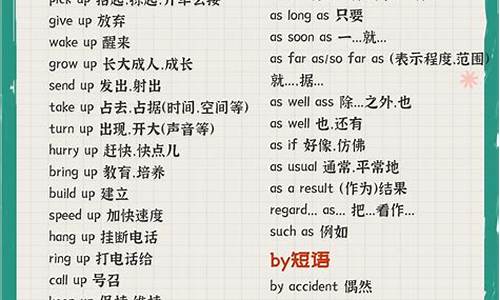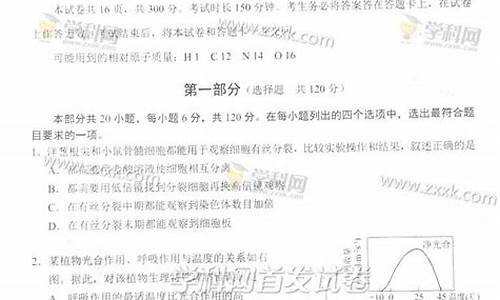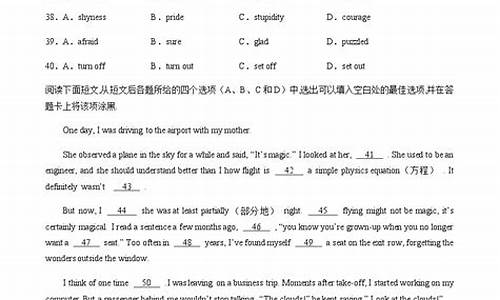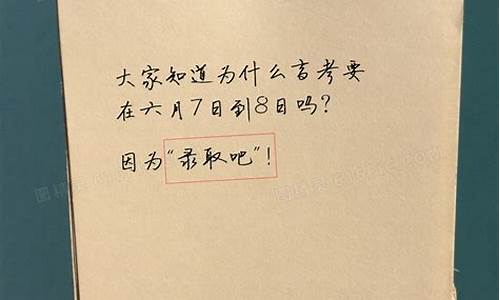您现在的位置是: 首页 > 专业报考 专业报考
高考to为介词的短语,高考常考介词to短语
tamoadmin 2024-05-22 人已围观
简介1.高中有哪些短语的to是介词be/get/become used to 习惯于I have been used to getting up early. 我早已习惯早起。be given to 沉溺于She is given to drinking. 她沉溺于喝酒。be related to和…有联系…His fear of people is deeply related to hi
1.高中有哪些短语的to是介词

be/get/become used to 习惯于
I have been used to getting up early. 我早已习惯早起。
be given to 沉溺于
She is given to drinking. 她沉溺于喝酒。
be related to和…有联系…
His fear of people is deeply related to his unhappy childhood
他对人的畏惧和他不幸的孩提时代有着密切的关系。
be addicted to沉溺于…;对…上瘾.
She is addictaded to drugs.他吸毒成隐瘾。
be opposed to 反对
She is strongly opposed to their plan.他强烈反对他们的计划。
devote oneself to献身于 。
She devoted herself to tennis in her teens.
他少女时代热衷网球.
be devoted to 献身于,忠诚于,爱…
She is devoted to here husband.他挚爱他的丈夫。
be admitted to被…录取 , 准进入
Li Ming is admitted to Beijing University.李明被北大录取。
be attached to附属于,爱慕,爱恋,敬仰
The middle school is attached toQing hua University。
这是清华附中。
be adjusted to 适应
She was soon adjusted to his way of life
他很快适应了他的生活方式。
adjust to适应
She soon adjusted to his way of life.
他很快适应了他的生活方式。
adsjust onself to 使…适应
She soon adjusted herself to his way of life 。
他很快适应了他的生活方式。
be adapted to适应
He is quickly adapted to a new circumstances。
他很快适应新环境。
adapt oneself to 适应
He is quick to adapt himself to a new circumstances。
他很快适应新环境。
be known to为…所知
As is known to all,paper was first made in China.
众所周知纸是中国人发明的。
be married to和…结婚
Tom has been married to Mary for 10 years.
汤姆和玛丽已经结婚10年了。
be sentenced to被判处
He was sentenced to 10rears in prison.
他被判处10年监禁.。
be connected to和…连在一起
I was connected to the wrong person.
我的电话接错了人。
be exposed to 暴露于/遭受/接触…
The bicycle was exposed to the rain and wind.
那辆自行车任由风吹雨打。
be compared to被比喻成
Teachers are often compared to candles.
教师常被比喻成蜡烛。
compare… to…把…比成…
People often compare children to flowers.
人们常把孩子们比喻成花朵。
be/become /get accustomed to惯于,有….习惯.
You will soon get accustomed to the job.
你很快就会适应这项工作。
be engaged to和…订婚
Jack is engaged to Linda.捷克和林达订婚了。
get down to着手做
Let’s get down to business.我们言归正传。
lead to 导致
All roads lead to Rome.条条道路通罗马。
object to 反对
He objects to beeing treated like a child.
他讨厌被当成小孩看待。
put one’s mind to全神贯注于
You should put your mind to studies.你应专心学习。
give rise to 引起
The dirty enviroment gave rise to diseases.
那肮脏的环境引起了各种疾病。
look forward to盼望
I’m looking forwad to seeing you.我盼望与你见面。
pay attention to注意
Please pay attention to your pronunciotion.请注意你的发音。
stick to坚持
He always sticks to his promise.他总是遵守诺言。
attend to 处理,照料
Attend carefully to what she is saying.注意听她说话。
see to 负责
Will you see to the plants while I’m away.
我不在时请您帮我照料这些植物。
contribute to对…做贡献
The construction of a highway will contribute to the growth of the surburbs.建造高速公路有助于郊区发展。
make contributions to对…做贡献
He has made great contributions to a space deveiopment programme.他对太空发展计划有很大的贡献。
apply oneself to致力于
He applied himself to the study of genes.他致力于基因研究。
come close to几乎,将近
He came close to being killed in the accident.他差一点在事故中丧生。
reply to 回答
she never replied to my letter.他从不回复我的信。
add to 增加
The news added to his anxiety.这消息增加了他的忧虑。
add up to加起来
These figures add up to fifty.这些数字总计为50
in addition to除…之外(还)
He speak s Frensh in addition to English.
他除了讲英语之外还会说法。
turn to转向,求助于
He has turned to keeping sheep.他已转行养羊。
feel up to能胜任
He doesn’t think he feels up to the job.他认为他不胜任这项工作。
look up to向上看,尊敬…
We should look up to our parents.我们应该尊敬父母。
admit to承认
He admmited to having broken the glass..他承认打烂了玻璃。
belong to属于
The computer belongs to me.这台电脑时我的。
take to喜爱,开始
I took to her at once我立刻喜欢上了她。
She has taken to drinking recently.他最近喜欢喝酒。
refer to 参考,提及,涉及
高中有哪些短语的to是介词
一、概念:
介词是一种用来表示词与词, 词与句之间的关系的词。在句中不能单独作句字成分。介词后面一般有名词代词或相当于名词的其他词类,短语或从句作它的宾语。介词和它的宾语构成介词词组,在句中作状语,表语,补语或介词宾语。例如:
二.相关知识点精讲
介词口诀:自从以当为按照,由于对于为了到;和跟把比在关于,除了同对向往朝;用在名词代词前,修饰动形要记牢。
1.表示地点位置的介词
1)at ,in, on, to
at (1)表示在小地方; (2)表示“在……附近,旁边”
in (1)表示 在大地方; (2)表示“在…范围之内”。
on 表示毗邻,接壤
to 表示在……范围外,不强调是否接壤
He arrived at the station at ten.
He is sitting at the desk.
He arrived in Shanghai yesterday.
Jiangsu lies in the east of China.
Russia lies on the north of China.
Fujian is to the south of Jiangsu Province.
2)above, over, on 在……上
above 指在……上方,不强调是否垂直,与 below相对;
over指垂直的上方,与under相对,但over与物体有一定的空间,不直接接触。
on表示某物体上面并与之接触。
The bird is flying above my head.
There is a bridge over the river.
He put his watch on the desk.
3)below, under 在……下面
under表示在…正下方
below表示在……下,不一定在正下方
There is a cat under the table.
Please write your name below the line.
2.表示时间的介词
1)in , on,at 在……时
in表示较长时间,如世纪、朝代、时代、年、季节、月及一般(非特指)的早、中、晚等。
如 in the 20th century, in the 1950s, in 1989, in summer, in January, in the morning, in the night, in one’s life , in one’s thirties等。
on表示具体某一天及其早、中、晚。
如on May 1st, on Monday, on New Year’s Day, on a cold night in January, on a fine morning, on Sunday afternoon等。
at表示某一时刻或较短暂的时间,或泛指圣诞节,复活节等。
如at 3:20, at this time of year, at the beginning of, at the end of …, at the age of …, at Christmas, at night, at noon, at this moment等。
注意:在last, next, this, that, some, every 等词之前一律不用介词。如:We meet every day.
2)in, after 在……之后
“in +段时间”表示将来的一段时间以后;
“after+段时间”表示过去的一段时间以后;
“after+将来点时间”表示将来的某一时刻以后。
My mother will come back in three or four days.
He arrived after five months.
She will appear after five o’clock this afternoon.
3)from, since 自从……
from仅说明什么时候开始,不说明某动作或情况持续多久;
since表示某动作或情况持续至说话时刻,通常与完成时连用。
He studied the piano from the age of three.
They have lived here since 1978.
4)after, behind 在……之后
after主要用于表示时间;
behind主要用于表示位置。
We shall leave after lunch.
Lucy is hiding behind an old house.
3.表运动方向的介词:
across, through 通过,穿过
across表示横过,即从物体表面通过,与on有关;
through穿过,即从物体内部穿过,与in有关。
She swam across the river.
He walked through the forest.
4.表示“在……之间”的介词:
between, among
between指在两个人或两个事物之间;
among指在三个或三个以上的人或事物之间。
There is a football match between Class One and Class Two on the playground.
The teacher is standing among the students.
5.表示其他意义的介词
1)on ,about 关于
on 表示这本书,这篇文章或演说是严肃的,或学术性的,可供专门研究这一问题的人阅读;
about表示内容较为普通,不那么正式。
There will be a lecture on economics this afternoon.
He is writing a book on cooking.
He told me a lot about his life in the summer vocation.
2)by, with, in 表示方法、手段、工具
by 以……方法、手段或泛指某种交通工具;
with 表示用 …工具、手段,一般接具体的工具和手段;
in 表示用…方式,用…语言(语调、笔墨、颜色)等;
He makes a living by selling newspapers.
He broke the window with a stone.
The foreigner spoke to us in English.
3)except, besides 除了
except 除……之外,不包括在内;
besides 除……之外,包括在内。
Except Mr. Wang, we went to see the film.(王先生没去)
Besides Mr. Wang, we also went to see the film.(王先生也去了)
三.巩固练习
1. Taiwan is ________ the southeast of China.(in, on, to)
2. Go _________ the bridge _________ the river, you’ll find the shop.(across, through; over, above)
3. I go to school __________7:30 every morning.(in, on, at)
4. He would like to meet her __________8:00 and 9:00 tomorrow morning.(between, among )
5. The Greens have lived in China ________ three years.(in, for, after)
6. We go to school every day ________ Saturday and Sunday.(except, besides)
7. He wrote the letter _________ ink.(by, with ,in)
8. She returned to her country _________five years.(in, after, for)
9. There is a big tree _________ our classroom.(after, behind)
10. I usually go to work _________ bike.(by, on, with)
其它常用介词
介词在英语词汇中所占比例很小,但它们的用法却非常灵活,复杂。下列为常用介词及含义:
about 关于,附近,大约,周围,随身.
I have bought a book about Shakespearean.
我买了一本有关莎士比亚的书。
There are about fifteen trees in the picture.
里大约有十五棵树。
above 在....上,高出,以上,超过,在...上游.
The plane is flying above the clouds.
飞机在云上飞行。
I think the man is above sixty years old.
我想那人有六十多岁了。
across 横过,对面,交叉,在...的对面.
Can you swim across the river?
你能游过河吗?
We live across the street.
我们住在街的对面。
after 在...后面,依照.
He went home after school.
他放学后就回家了。
Read after me, please.
请跟我朗读。
against 撞到,靠着,反对,违背,
The car hit against the tree.
汽车撞了树。
He is standing against the wall.
他靠墙站着。
along 沿着,顺着.
They are walking along the river.
他们沿着河行走。
among 在...当中.
He is the tallest among them.
他是他们当中个子最高的。
around 在...的周围,在...那一边.
They sat around the table talking the news.
他们绕桌而坐谈论新闻。
There is a drugstore around the corner.
拐角处有一家药店。
as 作为.
He doesn't like people treat him as a child.
他不喜欢人们把他当小孩子对待。
at 在...时刻,在...点钟,在...岁时, 向,在...之中,按...速度,值(卖)...钱,
He always gets up at six in the morning.
他时常早上六点钟起床。
He shot at the bird but missed it.
他向鸟射击,但是没射中。
The car goes at eighty miles an hour.
汽车以每小时八十公里的速度行驶。
before 在...的前面(位置),在...之前(时间)
He took a picture before the car.
他在汽车前照了张照片。
He can't finish his work before supper.
晚饭前他完不成工作。
behind 在...的后面(位置), 落后于,不如,
迟于,晚于(时间)
Are there any brooms behind the door.
门后有扫帚吗?
All of us are behind him in mathematics.
我们数学都不如他。
below 在...之下,低于,
There are four lights below the ceiling.
天花板下面有四盏灯。
The murderer run away below the police's eyes.
杀人犯从警察眼皮底下跑了。
beside 在...的旁边,在...之外,与...相比.
He found the body by the river.
他在河边发现了尸体。
Beside yours, my computer is too slow.
与你的计算机速度相比,我的就慢多了。
besides 除...之外,
We are all here besides Bowe.
除鲍外,我们也都来了。
between 在...两者之间,
The relations between the two countries has improved since then.
两国的关系从那以后得到了改善。
beyond 在...那边,
The shop you are looking for is beyond the street, you can't miss it.
你要找的商店在街的那边,你不会找不到的。
but 除去.
He has nothing but money.
他除钱以外什么都没有。
by 被..., 在...的近旁 , 在...之前, 不迟于, 以...为手段。
The classroom was cleaned by the students.
教室由学生们打扫干净了。
Miss Lucy came to China by air.
露西**是乘飞机来中国的。
down 沿着...望下。
She walked down the street.
她沿着街道走。
during 在...期间,在...时候。
During the holiday, we went to the south.
我们假期去了南方。
except 除...之外。
He knows nothing except English.
他除英语以外什么都不知道。
for 为..., 因为..., 至于... 。
He works for this company.
他为这家公司工作。
She came back to the classroom for she had left her books in the classroom.
她返回到教室是因为把书留在了那里。
from 从..., 来自..., 因为...。
Where are you from?
你是哪里人?
He died from an accident.
他死于一场事故。
in 在..., 在...之内,从事于..., 按照..., 穿着...。
He was born in 1992.
他生于1992年。
I could finish the program in two weeks.
我可以用两周时间完成这个项目。
He spend less time in reading.
他读书时间很少。
The man in black jacket is our teacher.
穿黑夹克的那个人是我们的老师。
like 象...,如同...。
The twins are like their father.
双胞胎象他们的父亲。
near 靠近....。
There are some flowers near the house.
房子附近有一些花。
of ...的,属于...。
This is a map of China.
这是一张中国地图。
off 离开...,在...之外。
The young man got off the train quickly.
那个年青人很快下了火车。
I live in a village a little way off the main road.
我住在离大路不远的一个村庄里。
on 在...之上。
My book is on the table.
我的书在桌子上。
out of 从...出来,在...之外。
The dog run out of the house.
狗从房子里跑出来。
outside ... 外边.
They are waiting outside the gate.
他们在门外等着。
over 在...之上,遍于...之上,越过...。
There is a light over the desk.
桌子上方有盏灯。
He is over sixty years old.
他有六十多岁。
past 越过...,过...,超越...。
The students walked past the post office.
学生们走过了邮局。
It is ten past two.
现在是两点十分。
round 围着...,绕过...,在...周围。
We sat round the table.
我们围着桌子坐下。
The earth goes round the sun.
地球绕着太阳转。
since 自... 以后,自...以来。
He has made great progress in English since he came into the college.
从他来到大学后,他的英语有了很大进步。
through 经过...,穿过...。
They went through the forest.
他们穿过了森林。
throughout 遍及...,在各处。
The police searched for the criminal throughout the mountain.
警察搜山寻找犯人。
till 直到...,在...以前。
He didn't come back till eleven o'clock.
他直到十一点钟才回来。
We'll be home till six.
六点以前我们都会在家。
to 到...,向...,趋于。
How long is it from here to the station?
从这儿到车站有多远?
under 在...之下,低于。
There are some footballs under the bed.
床底下有几颗足球。
These students are under seventeen years old.
这些学生们不到十七岁。
until 直到,在...以前,
Please wait for us until we come back.
请等着我们回来。
It was not until last week that I handed in mathematics paper.
直到上周,我才交了数学论文。
up 在...上面,在...上。
He went up the stairs.
他上了楼梯。
upon 在...之上,迫近...。
It's not polite to look down upon him.
蔑视他是不礼貌的。
within 在...之内。
You must finish the work within two weeks.
你必须两周内完成这项工作。
without 没有,不,在...之外。
We can't do it better without your help.
没有你的帮助,我们就做不好。
We couldn't live without air and water.
没有空气和水,我们就不可能生存。
高中阶段(至高考)介词to的词组总结如下:
object to(反对),be/get used to(习惯于),look forward to(盼望、期待),be devoted to(致力于、全神贯注于),devote oneself to(致力于),come close to(差一点就),pay attention to(注意),get down to(开始、着手),be reduced to(被迫、沦落到……的地步),take to(变得喜欢、开始经常),fall to(开始),lead to(导致),be opposed to(反对),come to(接近,差一点),refer to(提及、参考),agree to(同意某个观点,注意和agree to do同意做某事的区别),be on the way to(就要……),stick to(坚持)









